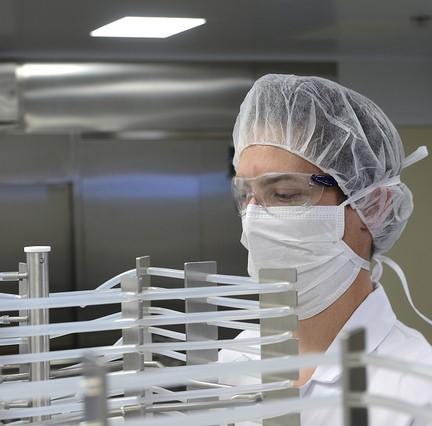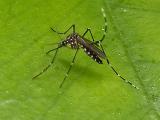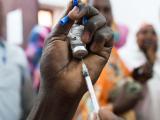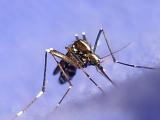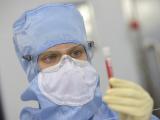According to a study today in the Annals of Internal Medicine, fractional dosing of the yellow fever vaccine offers recipients protective antibodies for up to 10 years without a booster dose.
The results could inform the use of fractional dosing in preventive vaccination campaigns, and not just outbreak settings. In related news, Nigeria is vaccinating millions of people after nine people recently tested positive, and Dutch officials report an imported yellow fever case.
High seroprotection levels
The randomized, controlled trial was conducted from 2005 to 2007 at Leiden University Medical Center in the Netherlands and included 75 participants who provided blood samples at 10 year follow-up after receiving either a 0.1-milliliter (mL) fractional dose of the vaccine intradermally or the standard 0.5-mL dose subcutaneously.
Participants who received a booster dose during the 10-year follow-up were excluded from the study. Both groups received the same vaccine, manufactured by Sanofi Pasteur.
According to the authors, 10 years after primary vaccination 73 of 75 (97%; 95% confidence interval [CI], 92% to 99%) participants had seroprotective antibody levels. Seroprotection was observed in 39 of 40 (98%; 95% CI, 89% to 100%) participants who received the intradermal fractional dose of 17D-YFV vaccine and 34 of 35 (97%; 95% CI, 87% to 100%) who received the subcutaneous standard dose.
Though the fractional dose (one-fifth) of 17D-YFV vaccine has been proven noninferior to full doses in previous studies, this is the first study to establish long-term immunity. Previously, the authors of this study showed that recipients of the fractional dose displayed a protective antibody response in healthy adults 1 year after primary vaccination.
"Our most important finding was that 97% of participants had seroprotective levels of yellow fever–neutralizing antibodies 10 years after primary vaccination with a one-fifth dose of 17D-YFV vaccine," the authors concluded.
Widening use of fractional dosing
Fractional dosing has been used in recent years in outbreaks in Brazil and the Democratic Republic of the Congo (DRC) as a way to stretch the global stockpile of the yellow fever vaccine.
In 2006, the World Health Organization (WHO) began the Yellow Fever Initiative, which entailed preventive mass vaccination campaigns in western Africa and ensured an emergency stockpile of vaccines. But because production of the yellow fever vaccine takes 12 months and uses pathogen-free embryonated eggs, production is difficult during a substantial outbreak.
Lead author of the study Anna Roukens, MD, PhD, from the Leiden University Medical Center said the study was encouraging news for the global stockpile of vaccine.
"If the minimum dose is guaranteed by the manufacturer, there is no reason why the standard dose could not be changed to this effective fractional dose, even in routine vaccinations," Roukens told CIDRAP News.
Nigeria vaccinating 26 million people
In related developments, the Nigeria Centre for Disease Control (NCDC) confirmed more cases in an ongoing outbreak in Edo state. As of Nov 21, nine people have tested positive for the virus.
Since September of 2017, 140 people in Nigeria have tested positive for the virus. Last week, ProMed Mail, an infectious disease message board, said two people in Edo likely died from yellow fever.
Nigeria is in the midst of the second phase of the largest yellow fever vaccination campaign ever, which aims to reach 26.2 million people to establish a high level of immunity in that country.
"The vaccination will be for people within 9 months to 44 years cohort, parents are advised to avail themselves and their children to partake in the vaccination; the vaccine is free, safe and effective," said Joseph Oteri, MD, the director of special duties at Nigeria's National Primary Health Care Development Agency.
The campaign will go through Dec 1. It is funded by Nigeria, the WHO, and GAVI, the Vaccine Alliance.
"Nigeria is on the front line in the global battle against yellow fever," said Seth Berkley, MD, Gavi CEO. "Routine immunisation coverage remains dangerously low, as shown by the latest outbreak, which is why this campaign is so important to protect the vulnerable. While this campaign will save lives, we need to focus our efforts on the best long-term solution—improving routine immunisation coverage so every child is protected, preventing outbreaks from happening in the first place."
In addition to cases in Nigeria, ProMed Mail notes a Dutch man has yellow fever after traveling to Gambia and Senegal. He was not vaccinated against the virus and is showing signs of liver failure.
See also:
Nov 27 Ann Intern Med study
Nov 24 NCDC press release
Nov 22 WHO Nigeria office statement
Nov 22 ProMed Mail post
